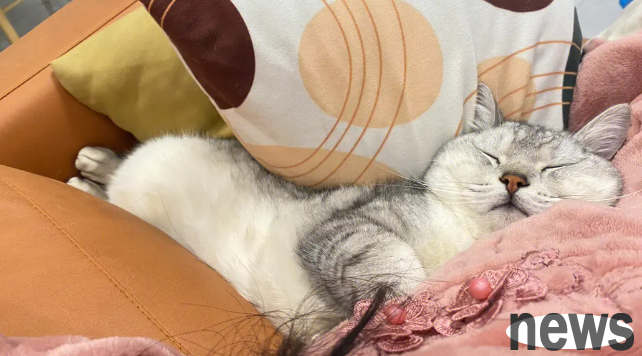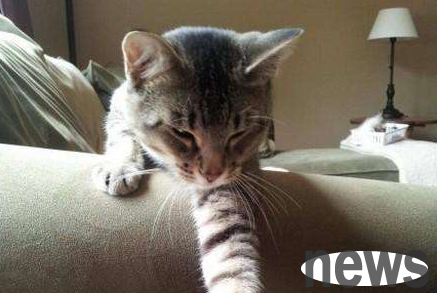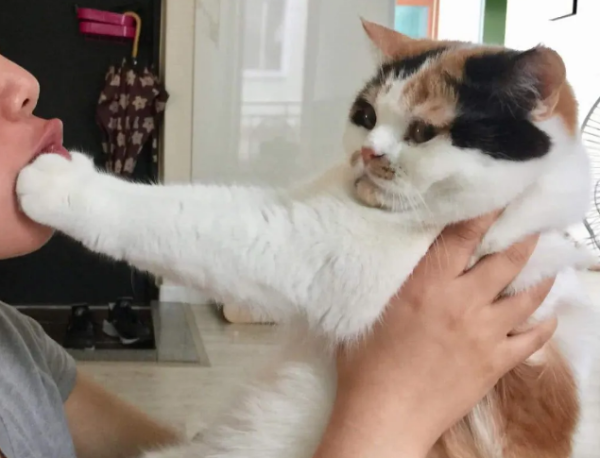Why is it painful to lie on the ground after a cat steals salted fish?
People know that eating too much salt will be bad for the body and increase the burden on the kidneys. Over time, it will form difficult to cure diseases. In fact, many foods should not be consumed in excess, and the same is true for cats.

Speaking of this, let's take a look at an example:
The family went out on a weekend because they were in a hurry before leaving, so they didn't pay attention to whether there was enough cat food left.
Cats with these characteristics are the real lucky cats. Don't cherish them. As a result, when I went home, I found that my cat couldn't help but snatched a whole salted fish hanging on the balcony. It was lying on the ground in pain, screaming.
Not only that, they also had symptoms such as foaming at the mouth, convulsions throughout the body, diarrhea, etc....
After being sent to the hospital, they were initially diagnosed as "salt poisoning" by the doctor. Fortunately, the rescue was timely and the cat was saved successfully...
This seemingly deadly rhythm is simply more terrifying than the legendary "eating more salt will cause hair loss" and "eating more salt will cause stones"!
Don't panic first, first look at the truth of "seeking for evidence when encountering legendary poisons".
What should cats consume daily salt?
Is salt harmful to cats without any benefit?
Will "salts accumulate into more" really cause "hair loss", "stones" or even "poisoning"?
For this reason, this claw has specially consulted various information to try to answer these questions about "salt".
Notes are here!
1. Cats shed hair, kidney disease, stones... may not be salt, but salt may indeed kill the cat!
2. Although salt may kill the cat, it is unhealthy to not eat it at all!
3. Let cats consume salt normally and pay attention to ensuring drinking water!
4. Reduce the chances of human contact with human processed food for cats!
Ask
Hair shed, stones... Is "salt" really so fierce?
The saying "cats will shed hair when eating salt" has a long history. But in fact, there is no clear evidence that "normal salt intake" and "hair loss" are directly related.
The main causes of abnormal hair loss in cats
1. Fungal or parasite infection: Cats are unfortunately infected with fungi, or are bitten by parasites such as fleas, and may scratch or bite the skin due to severe itching;
2. Improper washing and care methods: such as frequent bathing or using human toiletries, they may break the normal oil balance on the cat's body surface;
3. Inadequate nutritional intake: Due to malnutrition, especially insufficient meat intake, protein and fat deficiency related to hair growth;
4. Cats suffer from abnormal thyroid function, hyperadrenal cortex and other diseases, or hair loss due to allergies.
It is recommended to do this
1. Carefully check the concentrated hair loss area of the cat, first check whether there are parasites, and second check whether the skin under the hair has redness, bleeding, ulceration and scabs, etc.;
2. Review the cat's recent diet;
3. Confirm whether there are problems with excessive eating, picky eating, or partial eating in recent times
4. Confirm the time interval for the cat to take a bath recently and the shower liquid brand used, and consult a professional veterinarian with the above self-examination results.
As for the relationship between "salt" and "hypertension", "kidney deficiency (disease), etc., it should be explained here:
The current research on "salt causes health problems in cats" mainly revolves around the "sodium" element in "salt".
According to some current research evidence, the relationship between cats' intake of moderate amounts of sodium is not clear and the increased risk of hypertension, heart disease, kidney disease and urinary tract stones, but the occurrence of urinary tract stones is closely related to cats' insufficient drinking water.
It is worth noting that the example of "a cat stealing salty fish at home leads to salted fish" mentioned at the beginning of
is extremely rare in clinical practice. However, if not dealt with in time, the cat may still die within 24 hours. Therefore, it is also serious to avoid cats from consuming a large amount of salt in a single time.

Then I don't just feed the cat salt?
We have just mentioned that the main ingredient of "salt" is sodium chloride. After sodium chloride enters the cat's body, the main forms are sodium ions and chloride ions, which play an important role in the normal physiological activities of cats.
Sodium ions - maintain acid and base balance and maintain extracellular fluid capacity. Maintains the potential of excitable tissues and the generation and propagation of nerve impulses.
Chloride ions - maintains osmotic pressure and acid-base regulation of extracellular fluid.
If the cat lacks sodium and chloride ions, fatigue, anorexia, growth disorders, etc. may occur, which will pose a threat to health.
Another report pointed out that an appropriate amount of sodium can induce cats to drink water and reduce the risk of urethral stones and kidney stones.
How to avoid excessive sodium intake?
1. Suppose your cat uses commercial cat food with industry standard added sodium as its staple food every day. Since the water content in dry food is low, cats need to pay attention to ensuring drinking water, or cans cans to replenish water during food;
2. If the cat has been diagnosed with kidney disease, urinary tract stones and heart disease, it is recommended to consult a veterinarian and strictly select grain;
3. Prepare more water bowls at home, change clean water frequently, or choose an automatic water dispenser to lure the cat to drink more water;
4. In addition to not feeding people, it is also very good to strictly prevent eating. Important!
5. When eating or eating snacks, try to be an emotional foodie. Don’t have any eye contact with the cat, don’t pay attention to any form of coquettishness, and control your hands that you want to feed!
6. Clean up the dining table immediately after dinner and quickly clean up the kitchen garbage! It is strongly recommended to use a lid trash can!
7. Compatriots in Sichuan, Chongqing and coastal areas should strictly prevent cats from sneaking into the balcony and room with sausages, bacon, and salted fish!
In short, normal ingestion of "salt (sodium)" is more beneficial than disadvantages for cats, so we do not need to "talk about salt".
At the same time, believing in science and ensuring balanced nutritional intake is the most favorable "backup" for cat health. Blindly observing the so-called "cat common sense" that is "very widely circulated" may harm cats.














